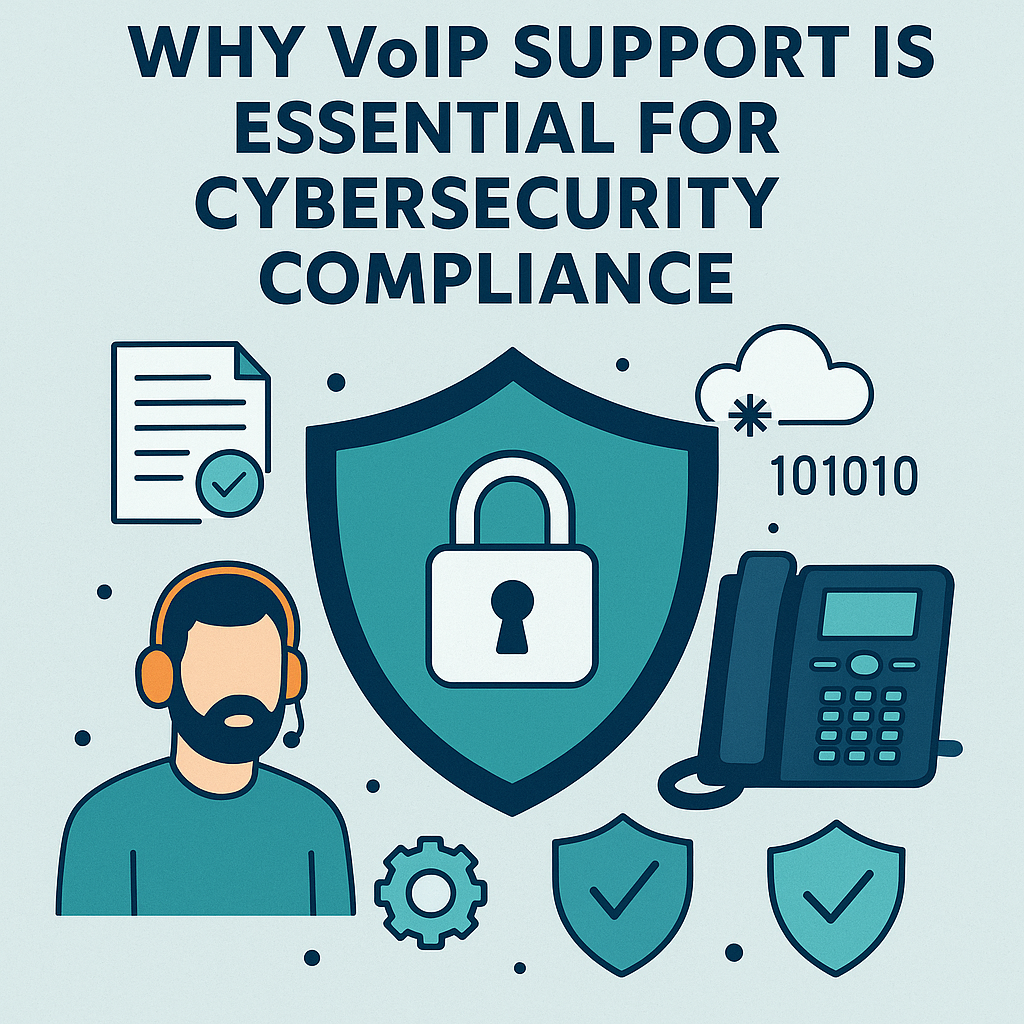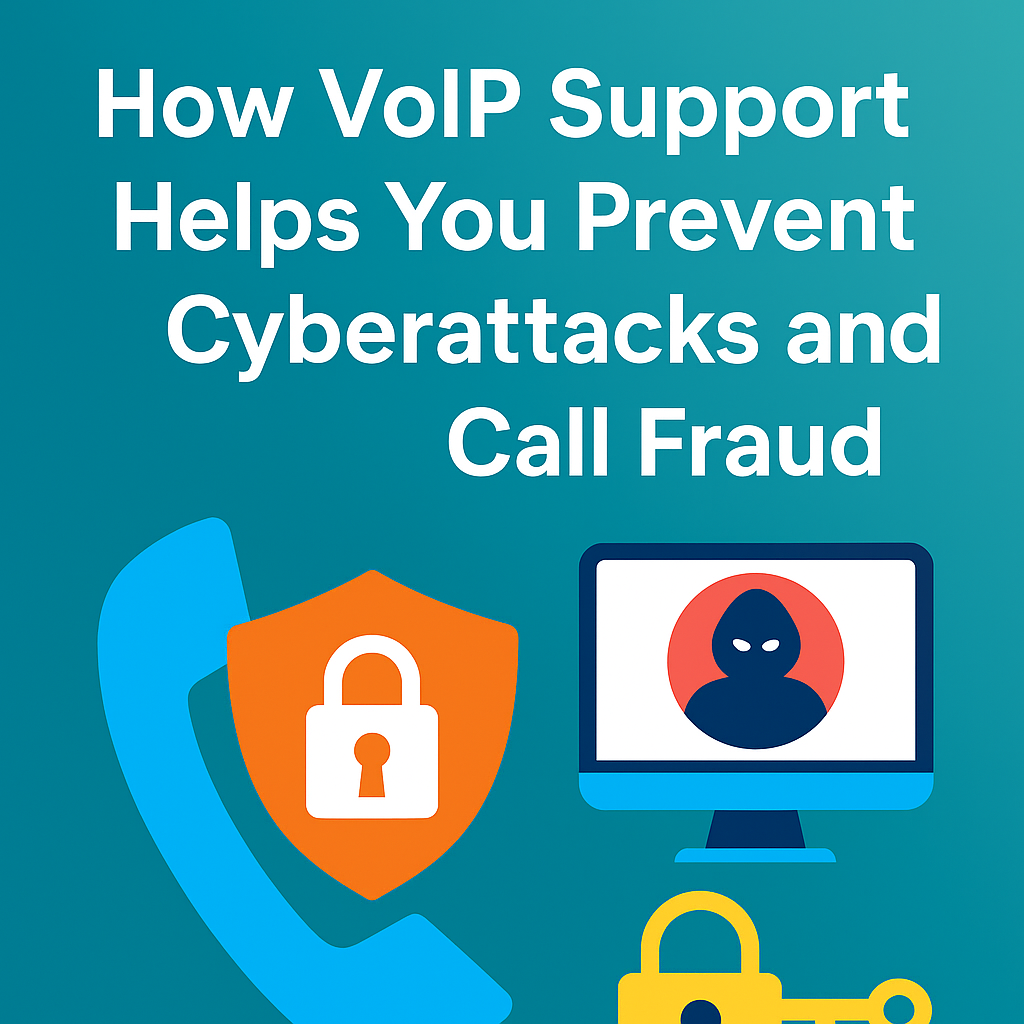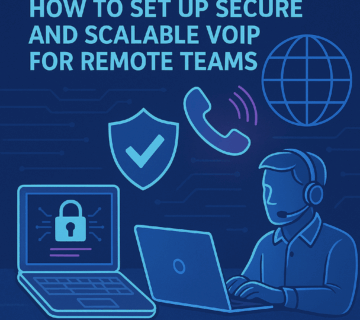How VoIP Support Helps Maintain Compliance Standards
Understanding VoIP Support and Its Growing Importance
VoIP, or voice over internet protocol, has completely changed how businesses communicate. It allows companies to transmit voice calls over the internet rather than traditional phone lines, leading to cost savings, improved scalability, and greater flexibility. As remote work surged, VoIP for remote workers became essential for maintaining seamless, secure global communications, ensuring teams stay connected from anywhere.
However, with convenience comes responsibility. Sensitive information often flows through VoIP systems, requiring robust measures to ensure compliance with various industry regulations. That’s why choosing a top business VoIP provider is crucial to ensure both functionality and regulatory adherence. For IT professionals managing these systems, leveraging the essential tools for IT technicians becomes key to maintaining VoIP system integrity.
The Critical Role of Compliance in Communications
In today’s digital landscape, regulatory bodies enforce strict standards to protect data, privacy, and transparency. Organizations that violate these laws risk severe fines, legal action, and harm to their reputation.
Failure to meet these standards can lead to:
- Loss of customer trust: A VoIP system leak including client data can quickly harm a business’s brand.
- Legal battles: Regulatory bodies like the FTC, GDPR, and HIPAA impose heavy penalties on non-compliant firms.
- Operational disruption: Non-compliance often results in investigations and audits that paralyze business operations.
Implementing robust IT support tools ensures compliance processes remain streamlined and errors are minimized, particularly in highly regulated industries.
Common Compliance Standards Affecting VoIP Systems
Several regulatory standards dictate how businesses must handle communications:
HIPAA Compliance and VoIP
Healthcare providers must ensure that their VoIP systems safeguard Protected Health Information (PHI). Encrypted communications, strict access controls, and secure data storage are essential to stay HIPAA-compliant.
For instance, a healthcare firm using VoIP without secure encryption can face fines up to $1.5 million annually for violations under HIPAA.
GDPR Compliance and VoIP
Businesses operating in the EU or handling EU citizens’ data must comply with GDPR. VoIP providers must ensure that data is processed lawfully, transparently, and securely.
GDPR focuses heavily on user consent, meaning VoIP systems must integrate easy-to-use consent management features.
PCI DSS Compliance and VoIP
Companies accepting card payments must adhere to PCI DSS guidelines. During voice conversations, VoIP systems must guard against unauthorized access to cardholder data.
For example, companies should use VoIP solutions that mask or avoid transmitting sensitive cardholder data altogether, reducing PCI DSS scope.
SOX Compliance and VoIP
Public companies must maintain strict records under the Sarbanes-Oxley Act. VoIP systems should provide audit trails, call logging, and secure storage to meet these requirements.
Employing professional server support can significantly ease the burden of SOX compliance by ensuring all VoIP call logs are securely archived and retrievable.
How VoIP Providers Ensure Compliance
Leading VoIP providers, especially a top business VoIP provider, integrate security measures and protocols designed to meet diverse regulatory requirements. Here’s how:
Data Encryption and Secure Storage
VoIP providers use end-to-end encryption to protect calls and messages. Data is often stored in secure, compliant cloud environments with advanced threat detection mechanisms.
An excellent practice is using zero-trust architecture where every call or connection is authenticated and verified independently.
Role-Based Access Controls
Limiting who can access sensitive communications is crucial. VoIP support teams implement role-based permissions, ensuring that only authorized personnel can view or modify sensitive data.
Organizations can customize user roles using advanced IT support tools, granting minimum necessary access based on job function.
Call Recording and Monitoring Compliance
When calls must be recorded for legal or business purposes, VoIP systems ensure recordings are securely stored, encrypted, and easily retrievable during audits.
VoIP solutions offering granular control over who can listen to, download, or share recorded calls significantly enhance compliance management.
Challenges Businesses Face Without VoIP Support
Without dedicated VoIP support, businesses face:
- Non-compliance risks with legal standards.
- Data Breaches that may lead to penalties and legal action.
- Operational disruptions due to insecure communication channels.
- Loss of customer trust from mishandled personal data.
This is even more critical for companies relying heavily on VoIP for remote workers, where scattered teams increase potential vulnerabilities.
A team equipped with essential tools for IT technicians and possessing credentials like desktop support technician certification can effectively manage these challenges, ensuring both compliance and operational resilience.
Moreover, professional server support becomes indispensable to ensure back-end systems run smoothly without compliance gaps.
How VoIP Support Teams Assist in Audits
VoIP support teams play a crucial role during compliance audits. They help by:
- Providing detailed call logs and recording histories.
- Assisting with security documentation and risk assessments.
- Implementing real-time monitoring to detect suspicious activities.
- Ensuring traceability and accountability for all communication records.
Certified professionals with backgrounds in desktop support technician certification often excel in preparing systems for stringent audit processes, ensuring that no compliance gaps exist.
With real-time data aggregation and report generation tools, VoIP support makes facing audits far less stressful and more streamlined.
Best Practices for Maintaining Compliance with VoIP
Regular Compliance Audits
Regular internal audits can identify weaknesses before they become serious issues. A quarterly review is ideal for fast-moving industries where regulations frequently evolve.
Staff Training and Awareness Programs
Employees must understand compliance responsibilities when using VoIP systems. Regular training helps ensure proper protocol adherence.
Especially for businesses using VoIP for remote workers, continuous training ensures that employees scattered across locations stay updated and compliant.
Utilizing interactive compliance training platforms can make it easy to train large, dispersed teams effectively.
Updating Policies with Regulatory Changes
Compliance standards evolve. Businesses must update their VoIP policies and protocols to stay aligned with new regulations.
Integrating modern IT support tools can automate policy updates and compliance tracking, reducing manual errors and increasing efficiency.
Also, creating a compliance task force within your IT department can ensure proactive monitoring of regulatory shifts.
Choosing the Right VoIP Provider for Compliance
When selecting a VoIP provider, businesses should consider:
- Built-in compliance features (encryption, access control, auditing).
- knowledge of regulatory frameworks such as PCI DSS, GDPR, and HIPAA.
- Transparent security policies and regular third-party audits.
- Responsive customer support for timely risk mitigation.
Choosing a top business VoIP provider ensures that your communication systems are both efficient and fully compliant with industry standards.
Having access to professional server support services also guarantees that backend infrastructure remains optimized, secure, and compliant.
A crucial tip is to ask for compliance documentation during provider evaluation stages — ensure certifications are current and independently verified.
Future Trends in VoIP Compliance Support
Emerging technologies like AI and machine learning are enhancing VoIP compliance capabilities. Future trends include:
- Automated compliance monitoring and anomaly detection.
- Predictive risk analytics for early threat identification.
- Adaptive security models tailored to evolving regulatory environments.
These innovations will especially benefit businesses depending on VoIP for remote workers, offering even stronger safeguards for distributed teams.
Additionally, upskilling IT teams with desktop support technician certification will become increasingly essential as compliance requirements evolve.
We can expect blockchain-based communication verification soon, offering tamper-proof communication logs for audit purposes.
Conclusion: Empowering Businesses through VoIP Compliance
VoIP systems are powerful tools for modern businesses — but with great power comes great responsibility. Proper VoIP support not only ensures seamless communication but also upholds essential compliance standards.
Businesses that prioritize VoIP compliance — particularly by partnering with a top business VoIP provider — position themselves for long-term success, building trust with customers, partners, and regulators alike.
Equipping your IT staff with essential tools for IT technicians, ensuring access to professional server support, and encouraging team members to pursue desktop support technician certification creates a strong foundation for compliance, security, and business growth.
As technology advances and regulations evolve, staying ahead of compliance trends with the right VoIP and IT support strategy will remain critical to thriving in the digital economy.
FAQs
1. How does VoIP encryption help in compliance?
Encryption ensures that voice data transmitted over the internet remains private and secure, helping businesses meet standards like HIPAA and GDPR.
2. Is call recording with VoIP legal?
Yes, but businesses must comply with local laws that may require informing participants that their call is being recorded.
3. What happens if my VoIP system is not compliant?
Non-compliance can result in heavy fines, lawsuits, damaged reputation, and even business closure in severe cases.
4. Can VoIP systems integrate with compliance management software?
Absolutely. Many modern VoIP providers offer API integrations that allow seamless connection with compliance tracking and management platforms, supported by advanced IT support tools.
5. How often should we audit our VoIP system for compliance?
At minimum, businesses should perform compliance audits annually, but quarterly reviews are ideal for dynamic industries.
6. What key features should a compliance-ready VoIP provider offer?
Look for end-to-end encryption, access controls, call logging, compliance certifications, and excellent support—especially important when selecting a top business VoIP provider.





No comment